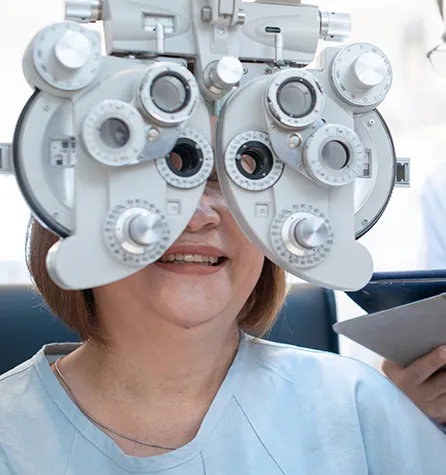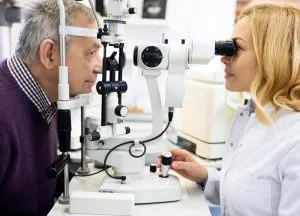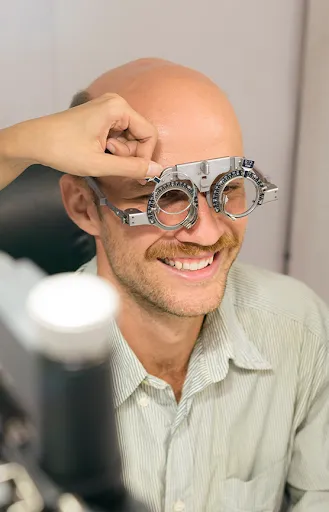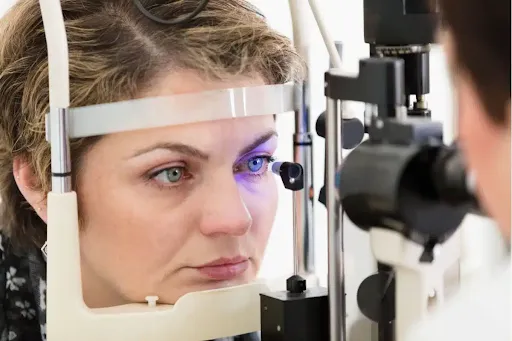Kleinwood Vision
Diabetic Eye Exams in
Houston, TX
Diabetic Eye Exams in
Houston, TX
FSDAVCFEBFEVSDDVFSD
FSDAVCFEBFEVSDDVFSD
FSDAVCFEBFEVSDDVFSD
Yearly Eye Exams with Diabetes
Diabetic eye exams are crucial for anyone managing diabetes, serving as a fundamental component of overall health monitoring. These specialized exams are designed to detect changes in the eyes that are indicative of diabetic retinopathy, a condition that could lead to severe vision impairment if not addressed promptly. By routinely assessing the health of the retina and the integrity of blood vessels in the eye, diabetic eye care professionals can identify the early signs of retinopathy. Timely detection is essential as it allows for interventions that can significantly mitigate the risk of vision loss and other serious complications associated with diabetes. Regular screenings by a diabetic eye doctor ensure that any signs of damage can be managed effectively, preserving eye health and maintaining the quality of life for those affected by diabetes.
Diabetic eye exams are crucial for anyone managing diabetes, serving as a fundamental component of overall health monitoring. These specialized exams are designed to detect changes in the eyes that are indicative of diabetic retinopathy, a condition that could lead to severe vision impairment if not addressed promptly. By routinely assessing the health of the retina and the integrity of blood vessels in the eye, diabetic eye care professionals can identify the early signs of retinopathy.

Timely detection is essential as it allows for interventions that can significantly mitigate the risk of vision loss and other serious complications associated with diabetes. Regular screenings by a diabetic eye doctor ensure that any signs of damage can be managed effectively, preserving eye health and maintaining the quality of life for those affected by diabetes.

Identifying Risks and Symptoms of Eye Conditions
Regular diabetic retinopathy screening is vital due to specific risk factors that can exacerbate the condition. Among these, poor blood sugar control and hypertension stand out as critical contributors to the development of eye-related issues in diabetic patients. These factors can lead to changes in the blood vessels of the retina, potentially resulting in vision loss. Additionally, the progression of diabetic eye conditions often occurs without noticeable symptoms in their initial stages, making the role of a diabetic eye specialist indispensable.
These specialists are trained to detect the subtlest signs of trouble, often before any visual symptoms become apparent to the patient. Regular examinations by diabetic eye doctors are essential as they can pinpoint early changes, such as microaneurysms or slight bleeding in the retina. This proactive approach allows for early management strategies, which are crucial in preventing significant damage and maintaining optimal diabetic eye health. Regular checkups facilitate timely interventions and continuous monitoring, significantly reducing the risk of severe diabetic eye complications and ensuring the ongoing preservation of vision.


Regular diabetic retinopathy screening is vital due to specific risk factors that can exacerbate the condition. Among these, poor blood sugar control and hypertension stand out as critical contributors to the development of eye-related issues in diabetic patients.
These factors can lead to changes in the blood vessels of the retina, potentially resulting in vision loss. Additionally, the progression of diabetic eye conditions often occurs without noticeable symptoms in their initial stages, making the role of a diabetic eye specialist indispensable.
These specialists are trained to detect the subtlest signs of trouble, often before any visual symptoms become apparent to the patient. Regular examinations by diabetic eye doctors are essential as they can pinpoint early changes, such as microaneurysms or slight bleeding in the retina.
This proactive approach allows for early management strategies, which are crucial in preventing significant damage and maintaining optimal diabetic eye health. Regular checkups facilitate timely interventions and continuous monitoring, significantly reducing the risk of severe diabetic eye complications and ensuring the ongoing preservation of vision.
Beyond diabetic retinopathy, other eye conditions such as glaucoma and cataracts are also prevalent among diabetic patients. Glaucoma, characterized by increased pressure within the eye, can lead to optic nerve damage and eventual blindness if left untreated. Cataracts, on the other hand, cause the lens of the eye to become cloudy, impairing vision. Both conditions can develop insidiously, further emphasizing the necessity of regular eye examinations.
By incorporating comprehensive eye care routines and leveraging advanced diagnostic technologies, diabetic eye specialists can provide personalized treatment plans. These plans not only address existing conditions but also focus on preventive measures to safeguard the patient's overall eye health. Through diligent monitoring and early intervention, the likelihood of maintaining clear vision and a better quality of life significantly increases for diabetic patients.
What Happens During a Diabetic Eye Exam?
A diabetic eye exam involves a detailed and meticulous process to ensure thorough examination and protection of vision for diabetic patients. During the exam, diabetic eye doctors start by dilating the pupils, a crucial step that enables a comprehensive view of the back of the eye, including the retina and its blood vessels. This dilation is achieved through eye drops that temporarily enlarge the pupils.
Once dilated, various tools and equipment are utilized to examine the health of the retina and to check for any signs of diabetic retinopathy or other eye conditions associated with diabetes. This may include the use of a slit lamp to view the front part of the eye and an ophthalmoscope to view the retina. Additionally, diabetic eye specialists often use imaging techniques such as fundus photography and optical coherence tomography (OCT) to capture detailed images of the eye structures.
These procedures are essential for assessing the blood vessels for any leakage, bleeding, or abnormal growth, all of which can signal diabetic retinopathy. The comprehensive nature of these exams ensures that any signs of damage are caught early, allowing for timely and effective management to prevent progression that could lead to severe vision loss.
A diabetic eye exam involves a detailed and meticulous process to ensure thorough examination and protection of vision for diabetic patients. During the exam, diabetic eye doctors start by dilating the pupils, a crucial step that enables a comprehensive view of the back of the eye, including the retina and its blood vessels. This dilation is achieved through eye drops that temporarily enlarge the pupils.

Once dilated, various tools and equipment are utilized to examine the health of the retina and to check for any signs of diabetic retinopathy or other eye conditions associated with diabetes. This may include the use of a slit lamp to view the front part of the eye and an ophthalmoscope to view the retina. Additionally, diabetic eye specialists often use imaging techniques such as fundus photography and optical coherence tomography (OCT) to capture detailed images of the eye structures.
These procedures are essential for assessing the blood vessels for any leakage, bleeding, or abnormal growth, all of which can signal diabetic retinopathy. The comprehensive nature of these exams ensures that any signs of damage are caught early, allowing for timely and effective management to prevent progression that could lead to severe vision loss.

Frequently Asked Questions
Frequently Asked Questions
What is a diabetic eye exam?
A diabetic eye exam is a comprehensive assessment focusing on identifying the early signs of eye conditions related to diabetes, such as diabetic retinopathy, macular edema, and glaucoma. It typically involves dilating the pupils to better examine the retina and optic nerve for any signs of damage.
Why are diabetic eye exams important?
Signs you may need corrective lenses include difficulty focusing, blurred vision, eye strain, and frequent headaches. A comprehensive eye exam at Kleinwood Vision can determine your need for corrective lenses.
How often should I have a diabetic eye exam?
These exams are crucial because diabetes can cause changes in the blood vessels of the retina that may lead to blindness if not diagnosed and treated early. Regular eye exams help monitor changes and manage conditions effectively before they cause significant vision loss.
What can I expect during a diabetic eye exam?
If you have type 1 diabetes, it is recommended to have a comprehensive eye exam within five years of your diagnosis and annually after that. For those with type 2 diabetes, you should get an exam as soon as you are diagnosed and at least once a year following diagnosis. Pregnant women with gestational or existing diabetes should have an exam in the first trimester and follow up as recommended by their eye doctor.
Are diabetic eye exams covered by insurance?
During the exam, your eye doctor will dilate your pupils and use instruments like a slit lamp and ophthalmoscope to look at the inside of your eyes. They may also use imaging tests like optical coherence tomography (OCT) and fluorescein angiography to get detailed images of your eye structures.
Can diabetes cause blurry vision?
Most health insurance plans cover diabetic eye exams as they are considered preventive medical care, not routine vision care. It's best to consult with your insurance provider to understand the specifics of your coverage.
What are the signs of potential diabetic eye disease?
Yes, fluctuating blood sugar levels can cause temporary blurry vision due to the swelling of the lens inside the eye. Consistently high blood sugar levels can lead to more serious conditions like diabetic retinopathy, which can cause permanent vision impairment.
Can diabetic eye exams detect other health issues?
Yes, these exams can reveal signs of other health problems, such as high blood pressure and high cholesterol, which can also affect the eyes and are common in individuals with diabetes.
What happens if signs of retinopathy or other eye diseases are found during an exam?
If your eye doctor detects any signs of eye disease, they might recommend treatments such as medication, laser surgery, or injections to slow the progression and prevent further damage.
Can vision loss from diabetic eye diseases be prevented?
Up to 95% of vision loss due to diabetes can be prevented with regular monitoring and early treatment. Maintaining reasonable control of your diabetes and blood pressure, along with regular diabetic eye exams, are key strategies in preventing significant vision loss.
Protecting Vision and Managing Diabetic Eye Health

Effective management of diabetic eye health involves a combination of treatments and regular monitoring. Treatments for diabetic retinopathy and other eye complications might include laser surgery to seal or shrink leaking blood vessels in the retina, injections of corticosteroids or anti-VEGF medication to reduce inflammation and inhibit the growth of abnormal vessels, and vitrectomy to remove blood from the vitreous humor in advanced cases.

Effective management of diabetic eye health involves a combination of treatments and regular monitoring. Treatments for diabetic retinopathy and other eye complications might include laser surgery to seal or shrink leaking blood vessels in the retina, injections of corticosteroids or anti-VEGF medication to reduce inflammation and inhibit the growth of abnormal vessels, and vitrectomy to remove blood from the vitreous humor in advanced cases.
Regular diabetic eye checkups are crucial for monitoring the condition and adapting treatment plans as necessary. These checkups enable diabetic eye specialists to assess the effectiveness of treatments and make timely adjustments to prevent the progression of the disease. Consistent monitoring also helps in identifying any new risks or complications at their onset, allowing for immediate action to safeguard vision.
Regular diabetic eye checkups are crucial for monitoring the condition and adapting treatment plans as necessary. These checkups enable diabetic eye specialists to assess the effectiveness of treatments and make timely adjustments to prevent the progression of the disease. Consistent monitoring also helps in identifying any new risks or complications at their onset, allowing for immediate action to safeguard vision. For those managing diabetes, scheduling your diabetic eye exam at Kleinwood Vision ensures that you receive expert care from trusted specialists. Don’t hesitate to secure your vision's future; contact Kleinwood Vision today and schedule a comprehensive diabetic eye checkup.
For those managing diabetes, scheduling your diabetic eye exam at Kleinwood Vision ensures that you receive expert care from trusted specialists. Don’t hesitate to secure your vision's future; contact Kleinwood Vision today and schedule a comprehensive diabetic eye checkup.

Contact Info
Hours of Operation
Mon - Fri | 9:00 AM - 5:00 PM
Sat - Sun | Closed
Holiday Hours: We are closed for the following holidays: New Years Day, Memorial Day, Independence Day, Labor Day, Thanksgiving Day, Christmas Day
© 2026 Kleinwood Vision. All rights Reserved.


